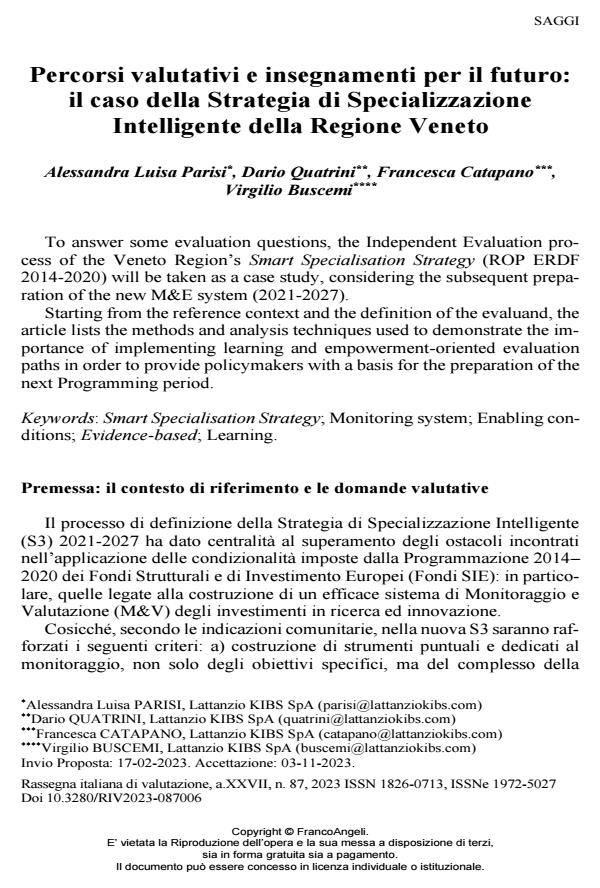Percorsi valutativi e insegnamenti per il futuro: il caso della Strategia di Specializzazione Intelligente della Regione Veneto
Journal title RIV Rassegna Italiana di Valutazione
Author/s Alessandra Luisa Parisi, Dario Quatrini, Francesca Catapano, Virgilio Buscemi
Publishing Year 2024 Issue 2023/87
Language Italian Pages 17 P. 92-108 File size 372 KB
DOI 10.3280/RIV2023-087006
DOI is like a bar code for intellectual property: to have more infomation
click here
Below, you can see the article first page
If you want to buy this article in PDF format, you can do it, following the instructions to buy download credits

FrancoAngeli is member of Publishers International Linking Association, Inc (PILA), a not-for-profit association which run the CrossRef service enabling links to and from online scholarly content.
To answer some evaluation questions, the Independent Evaluation pro- cess of the Veneto Region’s Smart Specialisation Strategy (ROP ERDF 2014-2020) will be taken as a case study, considering the subsequent prepa- ration of the new M&E system (2021-2027). Starting from the reference context and the definition of the evaluand, the article lists the methods and analysis techniques used to demonstrate the im- portance of implementing learning and empowerment-oriented evaluation paths in order to provide policymakers with a basis for the preparation of the next Programming period.
Keywords: Smart Specialisation Strategy; Monitoring system; Enabling con- ditions; Evidence-based; Learning.
- Agenzia per la Coesione Territoriale NUVEC Nucleo Verifica e Controllo. (2017). Report sui sistemi di monitoraggio delle strategie regionali di Smart Specialisation. Dicembre 2017. Esparza-Masana, R. (2021). Towards Smart Specialisation 2.0 Main Challenges when Updating Strategies. Journal of Knowledge Economy. 31 January.
- Gianelle, C., Kleibrink, A. (2015). Monitoring Mechanisms for Smart Specialisation Strategies. JRC Technical Reports.
- Gianelle, C., Kleibrink, A., Doussineau, M. (2016). Monitoring. In: Gianelle, C., Kyria- kou, D., Cohen, C., and Przeor, M. (eds.) Implementing Smart Specialisation: A Handbook. Brussels: European Commission.
- Hegyi, F.B., Rakhmatullin, R. (2017). Implementing smart specialisation - thematic plat- form on industrial modernisation. S3 Policy Brief Series, n. 22/2017.
- Kleibrink, A., Gianelle, C., Doussineau, M. (2016). Monitoring innovation and territorial development in Europe: emergent strategic management. European Planning Studies, 24 (8). Magro, E., Wilson, J.R. (2015). Evaluating territorial strategies. In: J.M. Valdaliso, and J.R. Wilson (eds.) Strategies for shaping territorial competitiveness, London: Routledge. Marinelli, E., Perianez Forte, I., (2017). Smart Specialisation at work: The entrepreneur-
- ial discovery as a continuous process S3, Working Paper Series No. 12/2017, Publications Office of the European Union, Luxembourg.
- Masana, R.E., Fernandez, T. (2019). Monitoring S3: Key dimensions and implications.Evaluation and Program Planning, 77.
- Rakhmatullin, R., Hegyi, F.B., Ciampi Stancova, K., Gomez, J., Mieszkowski, K. (2020). Methodological Manual. Developing Thematic Interregional Partnerships for Smart Special- isation. A Practical Guide to Building and Managing Interregional Smart Specialisation Part- nerships. Luxembourg: Publications Office of the European Union.
Alessandra Luisa Parisi, Dario Quatrini, Francesca Catapano, Virgilio Buscemi, Percorsi valutativi e insegnamenti per il futuro: il caso della Strategia di Specializzazione Intelligente della Regione Veneto in "RIV Rassegna Italiana di Valutazione" 87/2023, pp 92-108, DOI: 10.3280/RIV2023-087006